The present is less and less helping progress
Adelina Marini, January 28, 2011
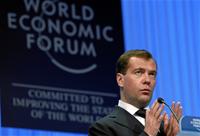 In spite that a lot of leading international media criticise the Annual Meeting of the World Economic Forum (WEF) in Davos (Switzerland) for its uselessness, for its hypocrisy and the expensiveness, where else if not at such a forum could be heard indicative messages of leading political figures, economists and business leaders? This year too is not an exception. The Russian president, Dmitry Medvedev, gave a very strong start of the meeting, who was given the honour to officially open the forum. In spite of the terrorist act at the Moscow airport Domodedovo only two days earlier, Mr Medvedev attended the event and right after his speech and the discussion that ensued he left.
In spite that a lot of leading international media criticise the Annual Meeting of the World Economic Forum (WEF) in Davos (Switzerland) for its uselessness, for its hypocrisy and the expensiveness, where else if not at such a forum could be heard indicative messages of leading political figures, economists and business leaders? This year too is not an exception. The Russian president, Dmitry Medvedev, gave a very strong start of the meeting, who was given the honour to officially open the forum. In spite of the terrorist act at the Moscow airport Domodedovo only two days earlier, Mr Medvedev attended the event and right after his speech and the discussion that ensued he left.
Quite naturally the issue of terrorism took a significant part of his speech, which however was multilayered and contained several key messages to the world.
Russia is modernising
Although much of the criticism against Russia was reasonable, it was a fact that Russia was opening, modernising and democratising, the Russian president said, while reading his speech in Russian. But the country is not modernising by itself, it is following a state strategy the purpose of which is to attract as many investors as possible, Russian talents and brains who have left their homeland in order to receive better education abroad. And although he demonstrated that Russia had bid a farewell to the ideologies from the 20th century and with the hostile tone in international relations, Medvedev clashed with Western world's efforts to impose regulation on global finances.
According to Mr Medvedev populist decisions prove to be wrong in 90% of the cases, and even harmful. Such an example, he said, was the trend all economic problems to be solved through nationalisation, including of financial institutions. "During the financial crisis, many states considered that course of action and many of them chose that option, including states with highly developed liberal economy. We don’t have a sufficiently developed economy in Russia but we did not resort to that option, and I believe we were right in doing that. I am confident that in most 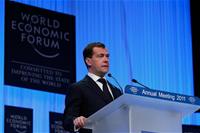 cases it is possible to find solutions to crises through the efforts of the private sector, and in the long-term perspective, this is the most effective way of dealing with things"*.
cases it is possible to find solutions to crises through the efforts of the private sector, and in the long-term perspective, this is the most effective way of dealing with things"*.
This is why Russia will continue privatising big state-owned assets; will create a special sovereign fund that will share the risks of foreign investors through joint investments in projects for modernisation of the Russian economy. And in defiance of the measures most developed G20 countries are trying to introduce (taxes on the financial sector), Russia will not introduce any special taxes, moreover - as of January 1st this year the country has removed the tax over revenues from securities sales if these were invested in the longer term. And in order not to leave any doubts, Medvedev specified: "We take a somewhat different line to our partners, including in the G20, on this issue".
Furthermore, Moscow intends to broaden the possibilities for financial institutions as much as possible and is aiming to turn into an international financial centre that would be a catalyst for the development of financial exchange markets in the post-Soviet area, and also in Central and Eastern Europe.
And, again, it's the education, stupid!
For nearly 20 years of transition Russia has managed to realise something to which, by the way, all countries that want good economic positioning emphasize lately - that economic development can be achieved only with talented, educated and free-minded people. "We realise that successful modernisation will be the product of tens of millions of personal success stories, the success of our own citizens and the hundreds of thousands of successful business stories from entrepreneurs and specialists from around the whole world. The source of any country’s strength and ability to be a global economic leader in the modern world is talented and educated people with knowledge, imagination, and a thirst for creation".
In the upcoming decade, Medvedev said, Russia aimed at becoming attractive for the best minds of the world and for the purpose it will recognise unilaterally and automatically all the diplomas and degrees from leading universities around the world. He added that currently the corresponding legislation is being drafted. And not only this, will be worked upon simplification of the immigrant regime for highly qualified specialists. In fact, the Russian president explained that this was a request of business representatives which he had taken into account.
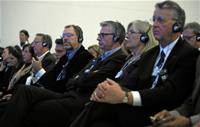 Given this point, which was ninth in his speech in Davos, in the coming years we can expect a global brain war to be unleashed, because Barack Obama as well announced in his annual State of the Union address as a main goal the US to keep and cultivate talents that received good education. Similar intention has the European Union as well (the idea of a blue card), which for now remain just good intentions because of the differences among member states.
Given this point, which was ninth in his speech in Davos, in the coming years we can expect a global brain war to be unleashed, because Barack Obama as well announced in his annual State of the Union address as a main goal the US to keep and cultivate talents that received good education. Similar intention has the European Union as well (the idea of a blue card), which for now remain just good intentions because of the differences among member states.
The world is flat, Internet is everything
The Russian leader quoted the famous economist Thomas Friedman by saying that the contemporary world is getting flatter and flatter, it is losing its official borders and barriers. Internet creates opportunities for people to gather beyond borders and nationalities, but it also creates risks on which any country can influence. Nonetheless, the Russian president said that another priority of his state was the spreading of broadband Internet all over the country. Besides, Medvedev mentioned as one of the most important state projects to integrate banking and public services using universal payment cards. "Development of electronic payment systems, public procurements and services will create a more convenient environment for ordinary people and for business too, not to mention that it will also be an effective instrument in fighting corruption in Russia", Medvedev explained.
We are all fragile and tender when facing climate change
Surprisingly the Russian president chose in the very beginning of his speech to talk about climate change and its impact on global economy and life. He said that human civilisation was technologically perfect but "yet a single natural anomaly or technological error can put entire regions on the brink of ecological disaster and separate continents from each other, as it was in the past centuries". He listed several of the natural disasters that occurred in 2010 like the eruption of the Eyjafjallajokull volcano in Iceland which caused the virtual death of air travelling; the massive disaster at the petrol platform in the Mexican bay; the abnormal heat which caused huge fires in Russia; the catastrophic floods, snowfalls in various ends of the world.
This was why, the Russian head of state added, actions on preventing climate change should not be delayed any longer. "Our objective is not just to complete the protracted climate negotiations, though this is imperative, but we must also create a common system for monitoring the environment and hazardous sites, and a general warning and disaster management system. Russia has put forward such an initiative, and I hope that our partners will also agree that these measures are long overdue".
Do not lecture us, let's work together
In general, Medvedev's entire speech was extremely odd for people born and raised in a certain period of the Cold War. In spite of everything the otherwise young Russian leader said, one realised that the credit of confidence was depleted. I wanted to believe in every word he said, because everything he said (not only he) was indeed righteous, but the doubt could not leave me that maybe there was something behind these words. Anyway, the feeling of sincerity was strong:
"Today politicians’ actions, international relations and the regulation principles are increasingly lagging behind progress. At the same time, some people, some politicians continue to believe in the phantoms of the Cold War and get carried away by their primitive ambitions of power. But it is precisely in this period that a considerable part of the global community, almost one billion people – just think about this figure – use social networks for the first time in the thousand-year history of humankind; they are communicating directly with each other while remaining on various continents. That is amazing".
And again - yes, Russia had a lot of deficiencies, a lot of problems on which it was working persistently and was ready to accept friendly advice from everyone but would not accept being lectured, Dmitry Medvedev concluded.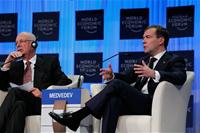
Transparency and secrets - WikiLeaks
The founder of the WEF, the German born Swiss Klaus Schwab asked a very provocative question. He asked the Russian president in the context of his statement about the Internet, whether there was something the WikiLeaks had revealed and that he himself would too. Medvedev laughed at this question and after deliberating for a while he said:
"That is a good question, thank you. I think that I in fact came to WikiLeaks’ defence in part just before when I said on this stage that a billion people are connected by invisible communication networks today. Not even the biggest secrets can be guaranteed safe today. Ultimately, the whole WikiLeaks affair should create a healthier climate in international relations. Yes, it is true that this affair involved what a number of countries would class as illegal activity, but I think nonetheless that it will have a very positive effect on international relations. As for the actual material leaked, I think that for some it might have been interesting and for others it was no secret anyway. As far as I am concerned, when I read the materials about Russia on the site I did not discover anything new. I had the impression now and then that most of the reports on Russia that made their way on to WikiLeaks were taken from general political sites on the internet. Maybe some had their sensitivities wounded by this affair, but not us; we’re a tough lot", Medvedev concluded.
Right after finishing with the opening ceremony of the Annual Meeting of the WEF in Davos, the Russian head of state left for his country where he was to continue his work in finding the perpetrators of the terrorist act at the Domodedovo international airport, where tens of people died, including a Bulgarian. Like I mentioned earlier, Dmitry Medvedev started his expose with terrorism by saying that terrorists obviously wanted to prevent him from taking part in Davos and this was why he decided to participated, in spite of the problems at home.
And as if responding to some visions about what foreign policy actually was, Medvedev admitted that no country in the world was immune to terrorism and this was why concerted action was necessary, focusing on eradicating the social-economic roots of terrorism - an issue which is available in many of the panels in Davos.
*All Mr Medvedev's quotes in English are taken from the translation provided on Kremlin's website
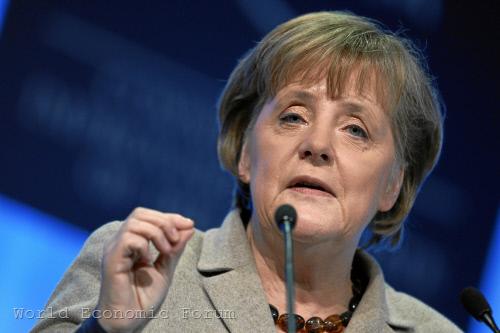 | © World Economic Forum
| © World Economic Forum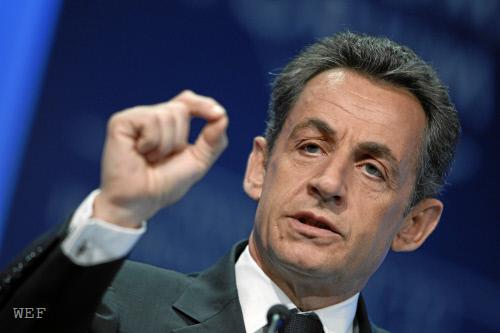 | © WEF
| © WEF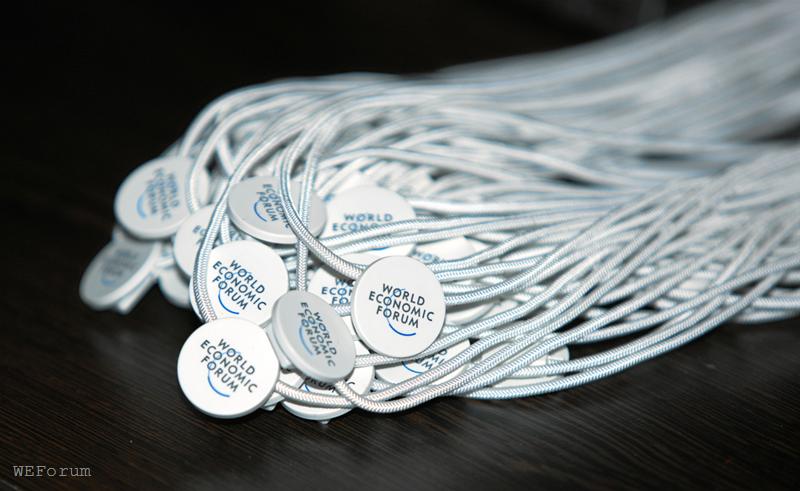 | © WEForum
| © WEForum